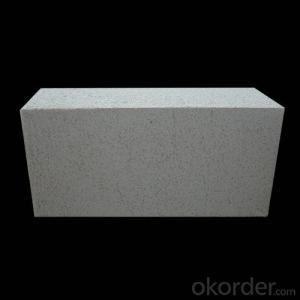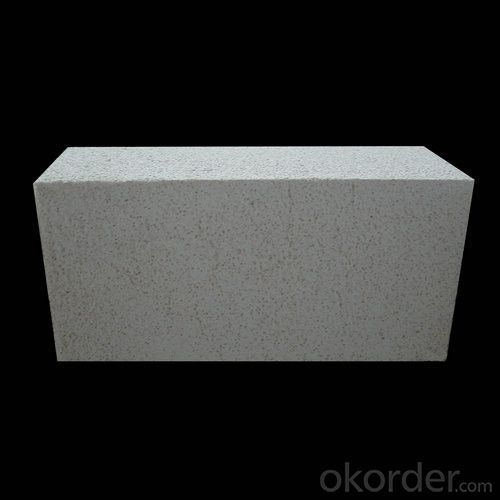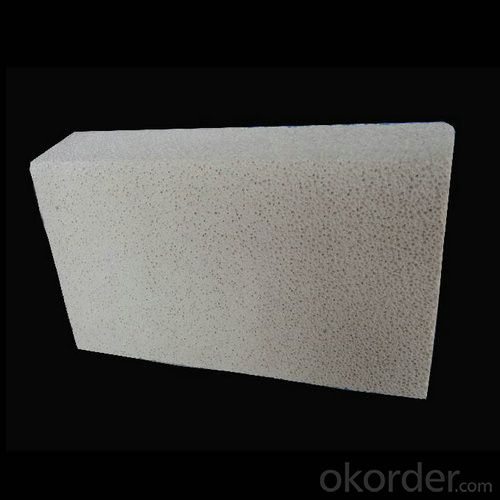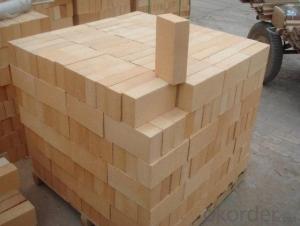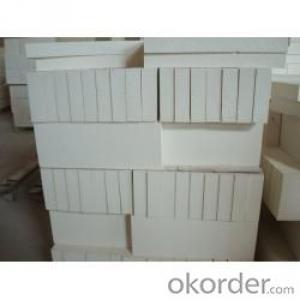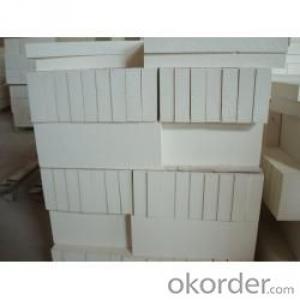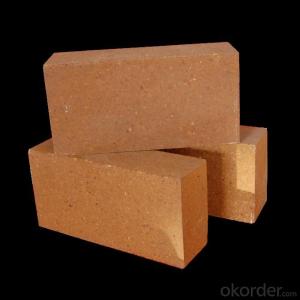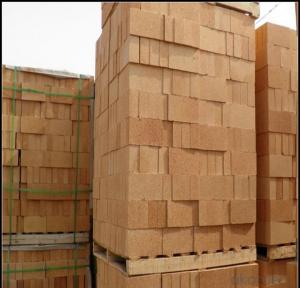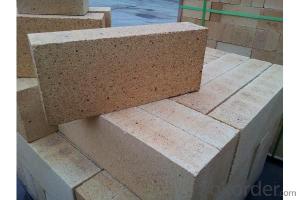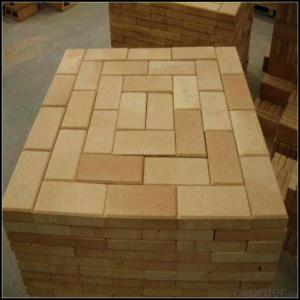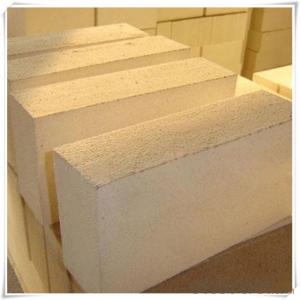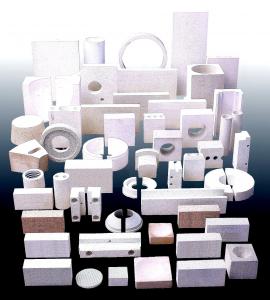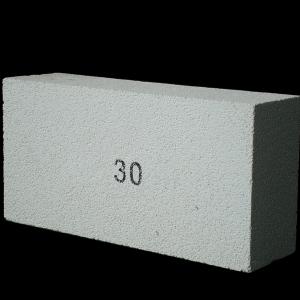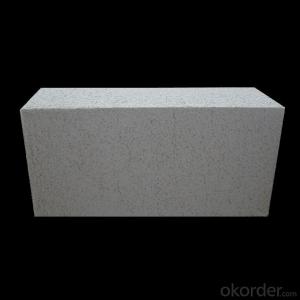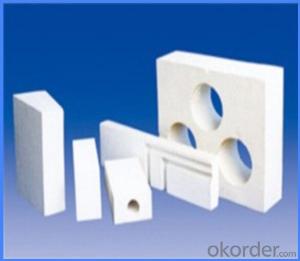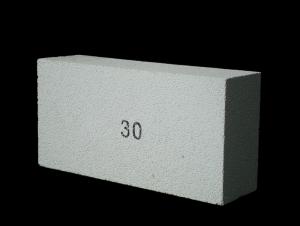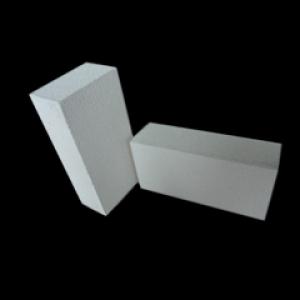Insulating Fire Brick for Industry Kilns - Lightweight, 2300F, 2600F, 2800F, 3000F
- Loading Port:
- Shanghai
- Payment Terms:
- TT OR LC
- Min Order Qty:
- 1 m.t.
- Supply Capability:
- 1000000 m.t./month
OKorder Service Pledge
OKorder Financial Service
You Might Also Like
Insulating firebrick
Insulating firebrick gains typical advantages including low thermal conductivity,fine thermal shock resistance,low heat containment and low iron content,meanwhile,the outstanding mechanical flexibility,coupled with high insulating efficiency expands the extensive applications of IFB in a variety of industrial markets.Our insulating firebrick is manufactured from high-grade refractory powder and materials in good purity.During the process of production,organic and multiple filling materials are injected according to the required proportion,the brick is compressed in vacuum and sintered under high temperature.
Features
Low thermal conductivity
High purity and low iron content
Good thermal resistance with direct access to fire
Superior thermal shock resistance
Accurate dimension and easy cutting
Typical Applications
Cracking furnace
Conversion furnace
Heating equipment
Refining equipment
Reproduction equipment
Hot blast stove
Description | Grade 23 | Grade 26 | Grade 28 | Grade 30 | |
Classification Temperature | 1300C/2372F | 1400C/2552F | 1500C/2732F | 1550C/2822F | |
Density(kg/m3) | 600 | 800 | 900 | 1000 | |
Cold Crushing Strength (MPa) | 1.2 | 1.8 | 2.5 | 3.3 | |
Modulus of Rupture(MPa) | 1.0 | 1.7 | 2.3 | 3.1 | |
Permanent Linear Change (%)x24hrs | ≤0.6 | ≤0.6 | ≤0.8 | ≤0.9 | |
Thermal Expansion (%)1000C | 0.5 | 0.52 | 0.52 | 0.53 | |
Thermal Conductivity (W/m.k) | 350C | 0.18 | 0.25 | 0.33 | 0.38 |
400C | 0.20 | 0.29 | 0.35 | 0.40 | |
600C | 0.24 | 0.32 | 0.37 | 0.42 | |
Chemical Composition (%) | Al2O3 | 42 | 56 | 67 | 73 |
SiO2 | 55 | 41 | 30 | 24 | |
Fe2O3 | ≤1 | ≤0.8 | ≤0.7 | ≤0.7 | |
K2O+Na2O | 1.1 | 1.7 | 1.7 | 1.7 | |
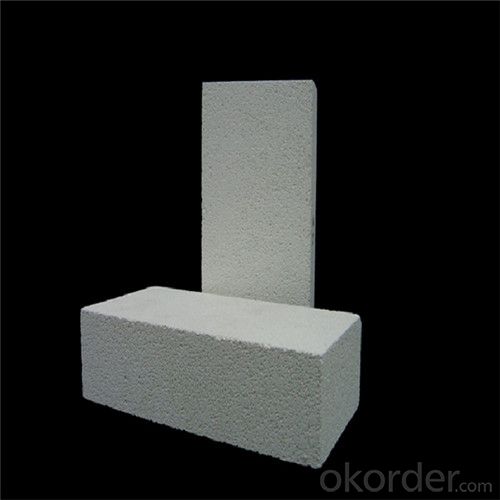
FAQ
Q3: Can you offer Door-to-Door delivery?
A3: Yes, but only for some countries such us U.S., UAE, Saudi Arabia, Iran, and Russia, etc.
Q4: What is the minimum quantity?
A4: There is no minimum order quantity. Depending on the item and processing, there may be a minimum production required, however we can offer a quotation based only on the quantity you need.
- Q: Are insulating fire bricks easy to clean?
- When it comes to cleanliness, insulating fire bricks have an advantage over other brick types. Their porous composition means they don't collect as much dirt or debris. To clean these bricks, simply use a soft brush or vacuum cleaner to remove loose dust or soot. For tougher stains or residues, a mild detergent solution can be used. Gently scrub and rinse the bricks afterwards. Be careful not to use harsh chemicals or abrasive materials that could harm the surface. With appropriate care and maintenance, insulating fire bricks can be cleaned with ease.
- Q: Can insulating fire bricks be used in the construction of rotary kilns?
- Yes, insulating fire bricks can be used in the construction of rotary kilns. These bricks are designed to provide thermal insulation and are commonly used in high-temperature applications such as kilns. Insulating fire bricks can help to reduce heat loss, increase energy efficiency, and ensure consistent and uniform temperature distribution within the rotary kiln.
- Q: Can insulating fire bricks be used in high-temperature insulation panels?
- Yes, insulating fire bricks can be used in high-temperature insulation panels. Insulating fire bricks are designed to withstand high temperatures and provide excellent thermal insulation. They are made from lightweight refractory materials that have low thermal conductivity, allowing them to effectively reduce heat transfer. These bricks can be used in various applications, including furnaces, kilns, and high-temperature insulation panels. They are capable of withstanding temperatures up to 3000°F (1650°C) and can effectively retain heat, making them an ideal choice for high-temperature insulation panels.
- Q: What is the price of concrete self insulation bricks?
- Insulation brick prices also have a great relationship with the material and workmanship, such as clay brick price is much lower than high alumina brick, mullite and corundum brick prices will be higher.
- Q: Can insulating fire bricks be used for insulation in oil refineries?
- Yes, insulating fire bricks can be used for insulation in oil refineries. Insulating fire bricks are designed to withstand high temperatures and provide excellent thermal insulation. They are made from lightweight refractory materials that have low thermal conductivity, allowing them to effectively minimize heat transfer. In oil refineries, where high temperatures and heat transfer are common, insulating fire bricks can be used to insulate various components such as furnaces, reactors, and pipelines. By using insulating fire bricks, the heat loss can be significantly reduced, improving energy efficiency and reducing operational costs in oil refineries.
- Q: Are insulating fire bricks suitable for insulation in heat treatment furnaces?
- Insulation in heat treatment furnaces can be effectively achieved by using insulating fire bricks. These bricks have been specifically engineered to endure high temperatures while offering exceptional thermal insulation. Their low thermal conductivity aids in reducing heat loss and ensuring a consistent temperature within the furnace. Furthermore, insulating fire bricks are lightweight, facilitating easier handling and installation. Moreover, they exhibit considerable resistance to thermal shock, enabling them to withstand sudden temperature variations without sustaining any cracks or fractures. To sum up, opting for insulating fire bricks proves to be a trustworthy and efficient solution for heat treatment furnace insulation.
- Q: Can insulating fire bricks be used in both residential and industrial applications?
- Yes, insulating fire bricks can be used in both residential and industrial applications. Insulating fire bricks are designed to provide thermal insulation, which helps to prevent heat loss and maintain a desired temperature in various settings. In residential applications, they can be used in fireplaces, wood-burning stoves, and kilns to improve energy efficiency and reduce heat loss. In industrial applications, insulating fire bricks are commonly used in furnaces, kilns, and other high-temperature environments to provide insulation and protect against heat transfer. They are also used in the construction of ovens, chimneys, and boilers in both residential and industrial settings. Overall, insulating fire bricks are versatile and can be applied in a wide range of applications, making them suitable for both residential and industrial use.
- Q: Can insulating fire bricks be used in biomass boilers?
- Yes, insulating fire bricks can be used in biomass boilers. These bricks are designed to withstand high temperatures and provide excellent insulation, making them suitable for use in biomass boilers where heat retention is crucial for efficient combustion.
- Q: What are the improvements and improvements during the trial production of insulating bricks?
- Per square metre weighs only about 1.4 kilograms, reduce the burden of building.Simple production: completely break through the traditional process, greatly shorten the construction cycle.
- Q: Are insulating fire bricks resistant to sulfates?
- Insulating fire bricks exhibit resistance to sulfates in general. These bricks consist of high-alumina or silica materials, which possess favorable chemical resistance properties. Sulfates, a type of chemical compound, can undergo reactions with certain materials, leading to deterioration. However, insulating fire bricks are specifically engineered to endure high temperatures and harsh chemical environments, including exposure to sulfates. They commonly find applications in furnaces, kilns, and incinerators where they might come into contact with sulfates. Nevertheless, it is crucial to consider the precise composition and quality of the insulating fire bricks, along with the concentration and duration of sulfate exposure, in order to guarantee their long-lasting performance and durability.
Send your message to us
Insulating Fire Brick for Industry Kilns - Lightweight, 2300F, 2600F, 2800F, 3000F
- Loading Port:
- Shanghai
- Payment Terms:
- TT OR LC
- Min Order Qty:
- 1 m.t.
- Supply Capability:
- 1000000 m.t./month
OKorder Service Pledge
OKorder Financial Service
Similar products
Hot products
Hot Searches
Related keywords
